Taylor | she/her | 24 | lesbian | welcome to my hyperfixation hell. currently serving FFXVI content
Don't wanna be here? Send us removal request.
Text
I was sort of joking when I said 7.2 would be the patch of wuksphene but they really have given us so much to work with:
Real Sphene and Wuk Lamat's relationship is almost immediately more wholesome, fulfilling AI Sphene's own statement that if they had met when she was still alive, perhaps things would have been different. There's still a lot to overcome and for Real Sphene to come to terms with (and for Lamaty'i as well) but they're finally properly seeing eye-to-eye. Even Wuk Lamat points out that Real Sphene's behavior was exactly what she had hoped she could bring out from AI Sphene. Their relationship in this stage is so hopeful it almost makes me nervous for the future (crying).
AI Sphene and Wuk Lamat were doomed already in 7.0, but I feel like the additional content of real (and Simulant) Sphenes in patches add a lot to what we had seen in 7.0. Lamaty'i tries her best throughout 7.0 to reach a common ground with AI Sphene. She didn't just want to save the people of Alexandria, she wanted deeply to save Sphene as well. It was a hopeless endeavor, as AI Sphene acknowledges this herself in the end, but in her final moments AI Sphene was at least able to express her regrets and return a bit of the faith Wuk Lamat had been placing in her (through entrusting Alexandria's future to Lamaty'i). When Simulant Sphene shows up in 7.1, Lamaty'i is so quick to denounce her, that the *true* Sphene would never do this, when she honestly barely even knew the true "real" Sphene at the time. I think Wuk Lamat projects a lot of what she wants to see from Sphene onto AI Sphene throughout 7.0, and even in her memory of her. 7.2 makes it hit harder (for me at least) to know AI Sphene *was* actually a lot like Real Sphene at the start, twisted by years of trying hopelessly to save her near-doomed society and made to dance to the tune of Preservation's true interests (Simulant Sphene outright says that AI Sphene was given an impossible task with the full purpose of driving her to means she might not have gone to if it could be helped. Even if her personality, modeled after Real Sphene, would find the act distasteful, she's quite literally programmed to follow a path that would result in her inevitably giving in to the hopelessness).
This is just my own interpretations, but I think it to be very possible that if the Real Sphene had been put through the same experiences as AI Sphene, it would be very possible for her to have turned out similarly, and I feel like Real Sphene shows this in how she's been coming to terms with the current situation in Alexandria. Naturally she's in a fair bit of disbelief, having learned that the current state of affairs has been more or less her own fault despite not having made the choices herself (which, that's gotta fuck with your sense identity hard). But, at least in my reading, she always also seems a bit nervous, like she's been forced to come to terms with her own ability for harm. She says herself that what sets her apart from AI Sphene was their experiences had led them down different paths, and I feel like this also points out that the inverse is true: if Real Sphene had been the one left to manage a dying Alexandria, what would she have done? She holds that same conviction to save her people by any means, but it's because she recognizes her own potential for evil now that we see her consciously attempt to put that devotion towards good instead.
And to talk on Simulant Sphene, *man* is she fascinating. She's a husk of AI Sphene, all the personality that made the AI anything close to her human counterpart gone. An empty shell that makes it even more clear everything is being orchestrated by Preservation. Sphene evidently mattered little to Preservation (or at least those in control now) other than a means to their ends. I think the cutscene where Simulant Sphene confronts Wuk Lamat is probably my favorite in the whole patch. It's just so utterly disturbing to see the person you (Lamaty'i) had tried so hard to save act so overtly twisted, not even trying to hold up the image of being Sphene anymore. This isn't the idealized Sphene Wuk Lamat had imagined, and its not even the Sphene she had known. There's nothing left but a puppet, dangled in front of Wuk Lamat to quite literally remind her of the Sphene she hadn't quite saved (even with Real Sphene right next to her. It's evident Wuk Lamat sees them separately, and in a manner struggles to move on from AI Sphene). And again here, Wuk Lamat stands up for Sphene – not just the Real Sphene, but the memory of AI Sphene as well. Simulant Sphene (Preservation really) is so purposefully toying with Wuk Lamat in their interactions (both in 7.2 and 7.2). Simulant Sphene and Lamaty'i not only have their own interesting dynamic, but add a lot of depth to the other facets of Sphene and Wuk Lamat both together and as individuals.
Sphene in all her sides is such an intriguing character and god this patch has done so much for me.. Wuksphene is so full of interesting character analysis points I don't think I can ever move on from them.
#ffxiv spoilers#dawntrail spoilers#dawntrail 7.2#wuksphene#sphene#ugggggh 7.2 was so fucking GOOD and TASTY
35 notes
·
View notes
Note
'shb is a pro abortion narrative' wtf is happening in the game about h-posing cat girls and boyz?
easy. the warriors body is being used as a vessel (womb) for all the excess light aether (jizz) in the first, which they are unaware will turn them into a lightwarden (bad sex education). they cannot stop this process once it's begun (gestation and social pressure to become a mother) though unbeknownst to them the crystal exarch plans to take the light into his own body (adoption) and leave (single parenthood).
emet-selch (the state) interferes in this process (destruction of social welfare systems). he wants to ensure his version of the future comes to pass (through mandatory reproductive labor) and cause another rejoining (reification of the nuclear family). the warrior must seek an alternative method of asserting their bodily autonomy (abortion) and blow a hole in the chest of the man who would try to choose for them (not a metaphor).
in other words,

304 notes
·
View notes
Text


drawings i made for a secret santa event for emi !
the idea being a distant past next to a more recent past but also the concept of maybe not so ideal soldiers and how accomplished they become later. together, of course.
#cries screams throws up#estimeric#estinien varlineau#aymeric de borel#estinien wyrmblood#ffxiv#ff14
488 notes
·
View notes
Text


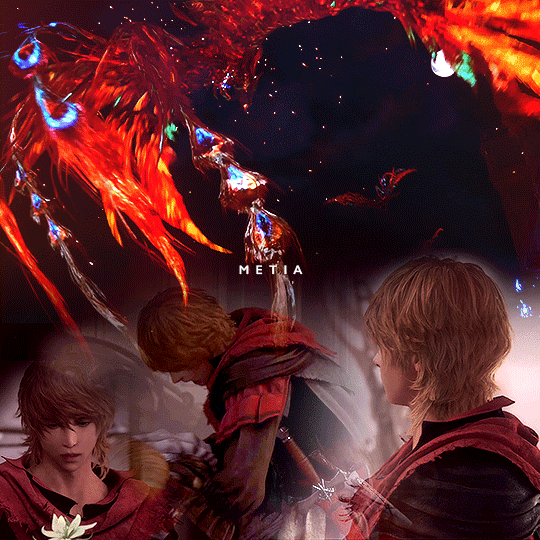
THE MOON & METIA ⤷ The Dragon and The Phoenix
“'The Phoenix and Bahamut would look regal amid the stars,' Joshua offers. 'In a world where the gods didn’t curse us, we would be the Moon and Metia—beacons in the darkness.”' - From A Break (From The Weight of My Mind) Joshua Rosfield & Dion Lesage in Final Fantasy XVI Part II of a Not So Secret Santa Gift for @ringoshiba + Part I: A Break (From the Weight of My Mind)
#did i reblog this already? maybe#idc its pretty tho#also its reminding me to get back to writing my fic#phoenixflare#ff16
138 notes
·
View notes
Text
I want to do sort of a deep dive on the character of Wuk Lamat. In a few posts, I've talked about how much Dawntrail parallels Heavensward. But in this case, I want to talk about how Wuk Lamat parallels Aymeric. Spoilers and lengthy rambling under the cut.
When we first meet Wuk Lamat, we are clearly meant to mistake her for sort of a carefree dumb jock. She wanders off before her important introduction because she's too busy oggling the scenery. She thinks with her stomach. She's not paying attention. She's all bluster and talk, but kind of a scaredy cat. This is all just a fun vacation to her. That's deliberate. We're meant to underestimate her. It's why we have that heart-to-heart scene with G'raha debating whether or not we should really be getting involved in her bid for the throne -- literally not a question we have ever been asked about any other political figure we've helped anywhere. We get asked this twice about Wuk Lamat. Once by G'raha and once by Erenville, and then again, later, we get asked our opinion of her qualifications by her dad, the ruler of Tural.
We are meant to feel that she doesn't know what she's doing. Because she doesn't. None of them do.
So, by comparison, let's look at Aymeric's introduction. When he first appears at Camp Dragonhead to meet with Alphinaud we know a few things about Ishgard via the MSQ and the side quests around Coerthas up until that point. The first thing is: Ishgard takes its church deadly seriously. Inquisitor Guillaime can literally just murder anyone he wants with very little evidence and nobody dares question it. The knights of the high houses may be splitting their attention between constant vigilance in their war against the dragons and constant vigilance in their power struggles against the other high houses, but if the church says jump, they're already in the air and falling off a cliff before anyone can ask how high. They haven't been part of the Alliance in decades, they don't talk to anyone, they murder their own people for asking questions. Our expectations going into our first meeting with an official representative of the Holy See, therefore, are not supposed to be positive.
And then the first words out of Aymeric's mouth to the WoL are fanboying at us. He talks circles around Alphinaud for the rest of the meeting, doesn't agree to do anything, and ends by asking us to watch a dead dragon for signs of suspicious activity. A request so baffling that Alphinaud even calls it absurd in the middle of a diplomatic meeting.
We are supposed to have doubts about him. That he knows what he's doing. That he's not just playing us for fools. Aymeric's introduction, just like Wuk Lamat's, establishes him as being kind of questionable as a leader and ally.
Unlike in Heavensward, we have no knowledge at all of Tuliyollal going into Dawntrail. So our first few beats of the MSQ are a high-level crash course in the place. But even before we get off the boat, we know that Wuk Lamat is considered the long shot in the rite of succession. In much the same way that we early on learn that Aymeric attained the position of Lord Commander of the Temple Knights despite his birth not being considered noble enough and over a more popular low-born contender for the job in Ser Zepherin. What we see of her during the storm, however, is that she is not only willing to act when she's so sick she can barely even stand, she will try to protect others, whether they're her people or not.
Our quick tour of the city sets the foundations for what's to come. The aetheryte is the work of her brother Koana, scholar, forward-thinker, techbro, and industrialist. The Landsguard, traditionally led by Tuliyollal's strongest warrior, are led by her brother Zoraal Ja, who has taken over the post from their father, meaning that he has already been acknowledged as being equal to their father in martial ability for three years now.
Wuk Lamat has no accomplishments at all.
And then we get to the bridge. And the Tuliyollal Saga. The legacy these claimants are trying to lay claim to is that of a peacemaker. Gulool Ja Ja actually is the leader that Thordan VII wanted to be. He's unified the disparate people of two entire continents who were at war for centuries, while the Holy See couldn't even unify the people inside one city. He's their hero-king. Almost revered as a living god by everyone you talk to. What Thordan thought he had to summon a primal to do, Gulool Ja Ja just did the hard way.
Here's where the parallels start to get interesting.
Aymeric, an orphan, was contending with the legacy of his father--a man who was related to him by blood, but who had never once acknowledged or cared for him. And that legacy consisted of a divide-and-conquer strategy: Keep the people divided so they can be more easily controlled, keep them tentatively "unified" against a common enemy so they don't have the impetus to rebel. The Dragonsong War was a necessary evil to Thordan because it kept the church in power.
Wuk Lamat, an orphan, is contending with the legacy of her father--a man who is not related to her by blood, but who had always acknowledged and cared for her. And that legacy consisted of collaboration. Between the peoples of Tural. Between himself and them. Between Reason and Resolve. And now his sons are trying to divide it up. Koana, even though he's well-meaning, is an illustration of "the road to hell is paved with good intentions." He wants to improve life for his people, but he doesn't actually know them or what they want, or understand the consequences of his choices. Zoraal Ja, the imperialist, wants to be Thordan VII. He doesn't have his father's ability to be a hero-king because everything's already been solved, so he'll invent problems he can heroically solve for them.
Wuk Lamat is the only Promise who has no ideas for the future, because she's already happy in the present. What's wrong with how things are now?
So much of the first half of Dawntrail is an object lesson on what Tuliyollal actually is, and what it is not. That, peaceful as it is now, the legacy of war and conquest has scarred every culture. That the people still have lasting problems. They are not all happy now. Which is why most of them support her brothers -- they want change, and both the First and Second Promise are offering change. Wuk Lamat's kidnapping is the turning point for her in this regard because she is attacked by people who are desperate. Including, ironically, Bakool Ja Ja. She foolishly follows a bandit somewhere alone, when it's pretty obvious this is a bad idea, but it's not like she's ever been attacked by her own people before. The bandits do not know how to change their circumstances except through violence, and she didn't even know that kind of desperation existed in her nation. Even forward-thinking Koana instantly succumbs to anger when faced with them--it never occurs to him to even look for the problem they were facing, let alone solve it, until his sister does it first.
This is not a problem that can be solved with a sword. Or even a train line. You can't fight or technology away generational trauma.
Heavensward has some wonky pacing due to it attempting to resolve plot points from the Bloody Banquet, but it does much the same thing as Dawntrail. We take a road trip across Dravania to learn first-hand what the war is and what it isn't. The dragons are just people, and we meet the first ones who will actually talk to us. These cultures are all scarred by the legacy of war and betrayal and loss, and they don't know how to change their circumstances.
Honestly, Aymeric's sudden insistence on confronting his father after we kill Nidhogg is the weakest point in the plot. It seems to come out of nowhere. He has not, up until that point, demonstrated a tendency to be hot-headed, and this is such a stupid thing to do it borders on suicide. Everyone present in the scene tells him that, but he does it anyway, and this is the tragic mistake that leads directly to Haurchefant's death. But this moment, the moment that he learns the truth that was always there, the lie that his people have always been like this, is just as much a shocking revelation for him as the bandits are for Wuk Lamat. None of this ever had to happen. They were not always at war with the dragons. They were not always divided into highborn and lowborn.
This was never a problem that could be solved with swords or prayer.
Both Aymeric and Wuk Lamat embody contradictions. Aymeric is the leader of the Holy See's military who absolutely does not trust the Holy See at all and kind of hates the pope. He is not a paragon of and champion for the old order, like he's supposed to be. He's a diplomat in full plate armor with a sword, and a revolutionary in the highest position in the church. Wuk Lamat is an axe-wielding princess of peace. She's a nepo baby, but somehow also an orphan. She's not a thinker, she's all feels, and yet she looks for the deeper problems while her brothers settle for the surface precisely because she still feels a problem where reason says everything is fine. The difference between reason and resolve is a big, recurring thing in Dawntrail.
Aymeric tells us after the Shiva battle that he learned early on to see the difference between words, deeds, and beliefs, and that's exactly what Wuk Lamat learns to do over the course of the plot. Zoraal Ja and Bakool Ja Ja accept the idea that the Rite of Succession is a contest that can be won, and never question it. They are both competing in a scavenger hunt, and that's all they're doing. Wuk Lamat realizes even before the Feat of Pots that it's a lesson. The point is not just to win a little keystone. And, gradually, she takes the lesson more seriously than the contest, which is why she wins. She stops worrying about how well Zoraal Ja is doing around Earthenshire and starts worrying what her people have to give up for peace. Our big reveal, like the vision we have after killing Nidhogg, is the conversation with Gulool Ja Ja where he admits to us that he isn't going to name the winner successor unless they learn the lesson he's teaching them. The words were "contest" but the deeds were "follow in my footsteps." Koana starts to pick up on this because he sees Wuk Lamat doing so, and it's the realization that she understood the problem better than him that makes him yield his place in the Rite to her.
Reason can find a solution to the problem, but resolve is what finds the problem in the first place.
Aymeric, notably, tells us that he understands the difference between words, deeds, and beliefs, but then still falls for Thordan's speech. He doesn't have an answer when Thordan asks him what he can offer their people in place of a thousand years of certainty about who they are and why they're fighting, even though he feels that Thordan is still wrong. He doesn't have words for his resolve. He still has to learn to trust his feelings more than authority.
The second half of Dawntrail, like the second half of Heavensward, has Wuk Lamat stepping into a position of power that she doesn't really know how to wield, although for Aymeric this comes more in Dragonsong than in Heavensward. The surprise attack by Zoraal Ja on Tuliyollal mirrors the attack by Estinien at the peace summit--someone they used to trust, someone who used to be close to them, is now an enemy and proves it without any ambiguity, and now they're in constant danger of war. Now they're both left struggling to figure out how to pick up the pieces of a terrified nation that just lost its beloved leader. Aymeric is blamed for Thordan's death. The father that he always resented for abandoning him. He also clearly blames himself for Haurchefant's death, making his entire relationship with the Fortemps family extremely fraught. Wuk Lamat is not held responsible for the loss of her own father--who was killed by his own biological son, just like Thordan was, who resented him for not giving him the throne. She is, however, responsible for Sphene's death, and she knows it, even if the people of Alexandria do not. And she is well known to have killed Zoraal Ja, their king... although he was not nearly so well loved as Thordan. She's navigating a much more difficult, if so far less violent situation, caught between her own grief over losing her father, her conflicted feelings about her brother, her nephew, who likewise has very conflicted feelings about his father, and Sphene--the remorseless invader who wanted to harvest the souls of her people as fuel, but whom she nonetheless felt a connection to.
Aymeric, in Dragonsong, has to find a way to bridge the gap between peoples divided by a thousand years of war and lies, and Wuk Lamat has to bridge a gap between actually different worlds and views of life and death so dissimilar they border on irreconcilable.
I am interested to see where that goes, because there's no obvious enemy to fight in Dawntrail. We don't have a looming undead great wyrm waiting to destroy Tuliyollal, so we're not set up (at least right now in patch 7.1) to end this with a climactic battle. (Although maybe we're about to get a looming undead robot queen?)
Either way, this isn't a problem we can solve with swords.
#THROWING UPPPP this is so good#ffxiv#dawntrail spoilers#heavensward spoilers#wuk lamat#aymeric de borel
49 notes
·
View notes
Text
Sphene and Wuk Lamat: A Theory
So... There's something that's been on my mind since I first played Dawntrail. And tbh, I'm surprised that I don't think I've seen anyone else come to the same conclusion, because it was really obvious to me.


Yeah uh... ever since like 10 minutes into meeting Sphene, I've suspected that her and Wuk Lamat are each others shards/reflections.
My initial suspicion was largely based on personality, the way that they immediately clicked and seemed to have a lot in common. And then I was like "wait a fucking second, they have almost exactly the same eye color, if not a perfect match," which pretty much cinched it for me.
(Note: technically - since, as far as we know, the Sphene we met was a recreation without a soul - it would have been the original, living Sphene who was Wuk Lamat's shard.)
It's pretty undeniable that they're set up as narrative foils from a character perspective, but I think it goes beyond that. This line in particular grabbed my attention:
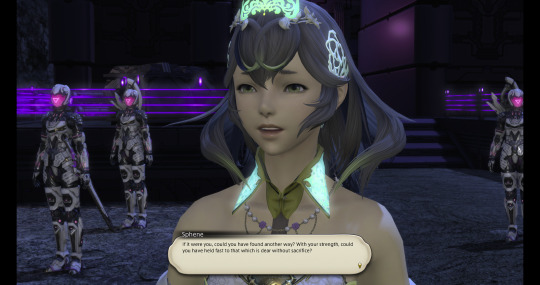
That's... pretty direct.
And that's also the big difference between them: Wuk Lamat is someone who is physically strong and was raised as a warrior; Sphene is neither of these things.
The other thing that's standing out to me is that this whole situation between them, where they have mutually conflicting goals? Where one invades the other's world, even, putting it into peril, for the sake of saving their own?
We've seen it before.

Even including the fact that the main character's reflection is already dead.
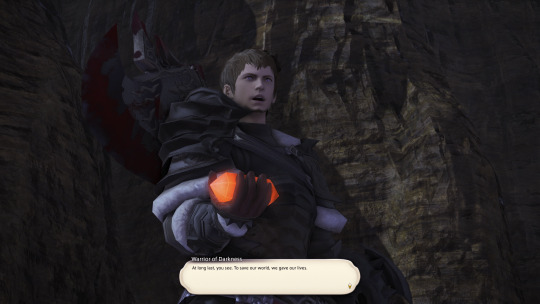
And after patch 7.1, I'm only more convinced... because guess what?
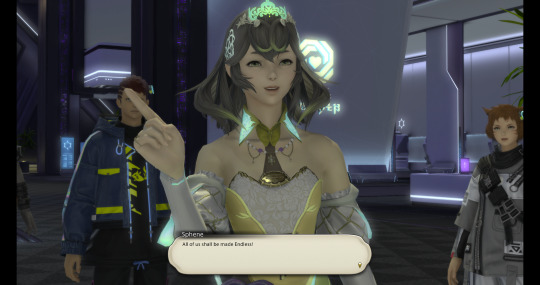
I daresay we've seen this before too.
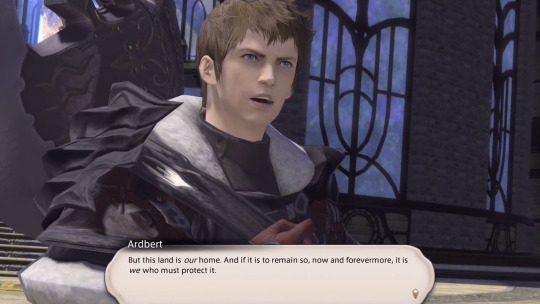
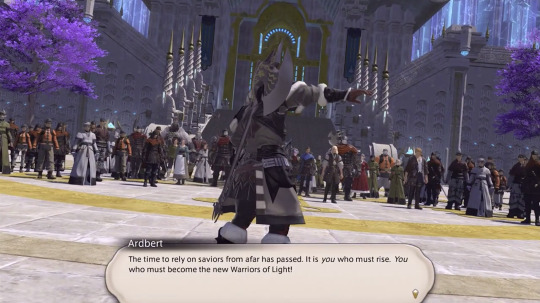
And beyond just the interesting narrative parallels between Sphene & Wuk Lamat and the WoL & Ardbert, the fact that Sphene's story clearly isn't over is making me think that this is going to be relevant.
424 notes
·
View notes
Text

Could you have held fast to that which is dear without sacrifice
3K notes
·
View notes
Text
dawntrail msq post lv96

2K notes
·
View notes
Text

that one romeo and juliet painting but make it estimeric 💙
#BARK BARK BARK#I LOVE THEM YOUR HONOR#final fantasy xiv#ffxiv#estimeric#estinien varlineau#aymeric de borel
578 notes
·
View notes
Text
the most fun a girl can have is finding parallels, noticing patterns, making connections, contemplating
191K notes
·
View notes
Text

There's something funny about how the dude without ANY decoration (like, it was a highlight that he got a HAIR TIE) is often shipped with the two characters who are notoriously generous and got more gold than Nald ever intended someone to have.
Also, sorry for the low-effort gold and coloration, I kinda lost motivation halfway through (maybe I finish it one day). Just insert the "started making it, had a breakdown, bon appetit meme" here.
55 notes
·
View notes
Text

when you would've hatched your best evil plan yet...if only it weren't for thOSE MEDDLING KIDS
125 notes
·
View notes
Text
i know i've referenced how chain of memories has had some things lost in translation due to the nuances of jp pronouns a few times on here, but i finally read the essay on the subject and i think this is like.... Actually mandatory reading for every kh fan.
like "you probably don't understand a fundamental aspect of sora's story in chain of memories if you haven't read this essay or played the game in jp" level of mandatory.
yes it's like 300 pages long, because they go through the whole game establishing the facts and then analyzing the implications and ruling out potential interpretations of them, for the sake of being thorough. if you really don't want to read it all (even though i recommend you do), you can read the intro and skip down to the summaries they have at the bottom of each part and get the gist.
it's also like practically undeniable evidence that sora's in love with riku. im actually not being flippant when i say this, or proposing a theory, or exaggerating for comedic effect. im dead serious. i cannot find any other plausible explanation for some of the stuff in here. much less the sheer amount of it. and emphasis put on it.
#top ten essays of all time fr#genuinely the reason why i started believing in soriku endgame actually#soriku#kingdom hearts
90 notes
·
View notes
Text
the tridisaster trio survived origin and you can pry that shit from my cold dead hands
“oh but joshua said that he couldnt sense bahamut” bahamut was knocked out by ultima’s attack. we never see dion’s dead body- he has also survived falling from much greater heights
“We watched joshua die” and clive healed his wounds. they never confirmed to what extent
and clive literally woke up on the beach.
#finished my 3rd playthrough and TAPPING THE SIGN#Joshua doesnt even say that dion is dead he just shakes his head when clive asks about him#also no body no death a la dion is like a huge thing in fiction works#AND WHY WOULD CLIVE DIE AFTER WAKING UP ON THE BEACH HUH. ANSWER ME THAT#anyways.#dion lesage#clive rosfield#joshua rosfield#ff16#final fantasy 16
47 notes
·
View notes
Text

i closed my eyes and saw my father's sins / they covered me like a second skin
1K notes
·
View notes

